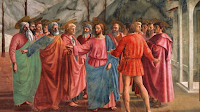Ezek. 33:7-9; Rom. 13:8-10; Mt. 18:15-20
Today's Gospel passage from Matthew reminds us of the importance of reconciliation and the power of community in our lives as followers of Christ. It's a passage that speaks of how we should handle conflicts within our faith community, and it offers us a roadmap for healing and restoration.
The power of reconciliation is not only felt here on earth but also recognized in heaven. Jesus tells us that whatever we bind on earth will be bound in heaven, and whatever we loose on earth will be loosed in heaven. When we come together in unity, seeking reconciliation and forgiveness, our actions resonate with the divine will. It is a theme that runs deep through the teachings of Christ, and it holds the potential to heal
wounds, mend broken relationships, and bring about profound transformations in our lives.In the classic novel "Les Misérables" by Victor Hugo, we encounter the remarkable journey of two characters, Jean Valjean and Javert. Valjean, a former convict, seeks redemption and starts a new life, but Javert, a relentless police inspector, is determined to bring him to justice. Throughout the story, Javert's pursuit of Valjean is unwavering, driven by a sense of duty and justice.
However, a pivotal moment occurs when Valjean saves Javert's life from imminent danger. This act of mercy and compassion completely shatters Javert's understanding of justice. He grapples with the realization that Valjean, the supposed criminal, is capable of such goodness. In the end, Javert cannot reconcile this newfound truth with his rigid beliefs, leading to a profound inner conflict.
Javert's internal struggle represents the power of reconciliation within us. Sometimes, confronting our own biases and preconceived notions can be as challenging as reconciling with others. The story reminds us that reconciliation begins within ourselves, as we confront our own judgments and prejudices.
Perhaps one of the most remarkable examples of reconciliation in recent history is Nelson Mandela's role in the peaceful transition of South Africa from apartheid to democracy. After 27 years in prison, Mandela emerged not seeking revenge but reconciliation. He worked tirelessly to bring about racial harmony and forgiveness, symbolized by the Truth and Reconciliation Commission. Mandela's actions demonstrate that reconciliation can heal even the deepest wounds of a nation.
These Old Testament stories serve as powerful examples of reconciliation, emphasizing the importance of forgiveness, compassion, and the healing of broken relationships.
One such great story is that of Joseph and His Brothers (Genesis 45): Joseph was sold into slavery by his jealous brothers. After years of separation, Joseph, now a powerful figure in Egypt, forgave his brothers and reconciled with them when they came to him in need during a famine. He famously said to them, "You intended to harm me, but God intended it for good to accomplish what is now being done, the saving of many lives."
In Genesis 33 we read of the reconciliation between Jacob and Esau. Jacob and Esau were estranged brothers due to Jacob's deception and stealing of Esau's birth right. When they eventually met again, Jacob feared for his life, but Esau forgave him, embraced him, and they were reconciled. This story illustrates the power of forgiveness and the restoration of family bonds.
On a personal level, many of us have witnessed the power of reconciliation within our families. Estranged siblings, parents and children, or distant relatives can often find healing through open communication and forgiveness. These stories remind us that reconciliation is not limited to grand gestures but can occur in the everyday interactions of our lives.
Reconciliation is not a sign of weakness but a testament to the strength of the human spirit. It requires courage, humility, and a commitment to love and understanding. Just as Christ taught us to forgive "seventy times seven," so too can we find peace and transformation through the act of reconciliation.
Martin Luther King Jr. reminded us, "Darkness cannot drive out darkness; only light can do that. Hate cannot drive out hate; only love can do that." When we gather in love, the light of Christ shines through us, dispelling darkness.
Let us remember that reconciliation is not just a one-time event; it is an ongoing process that requires patience and persistence. When we seek reconciliation within ourselves and in our relationships with others we become instruments of God's grace, bringing healing and unity to our world. And Jesus assures us that in moments of reconciliation and harmony, His presence is guiding us toward a more loving and forgiving community.
Satish
